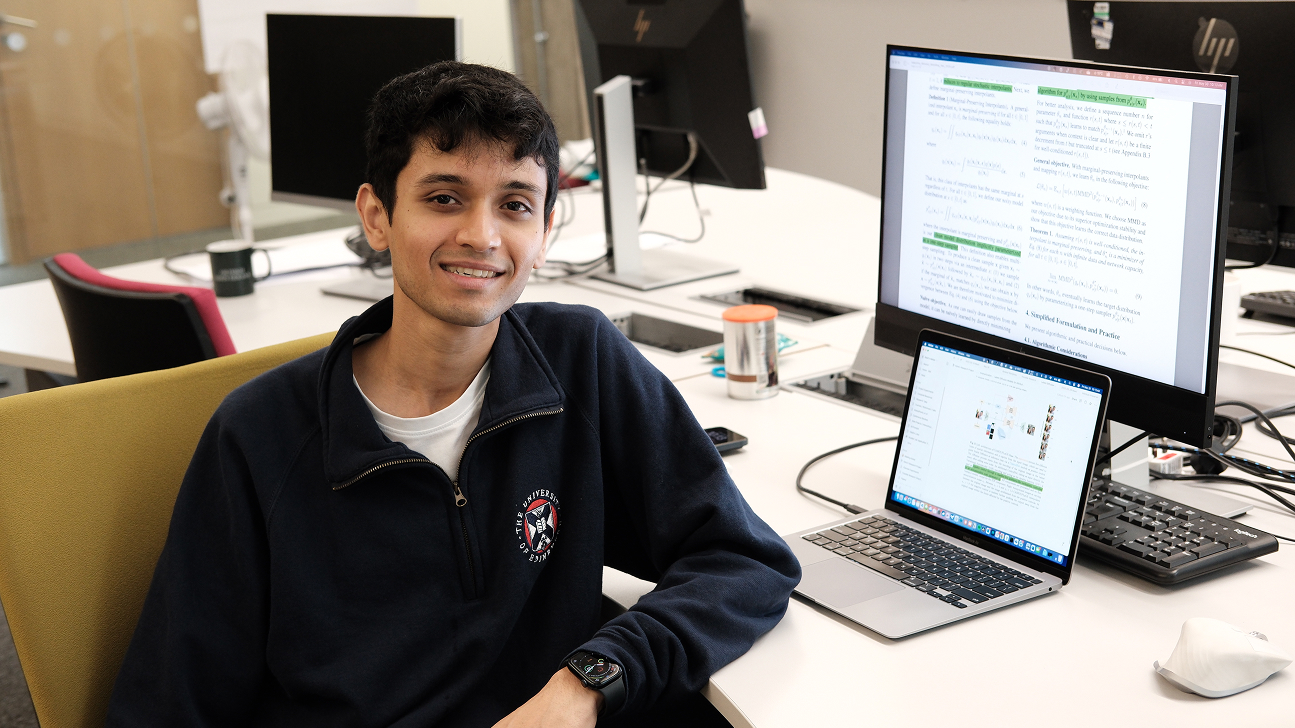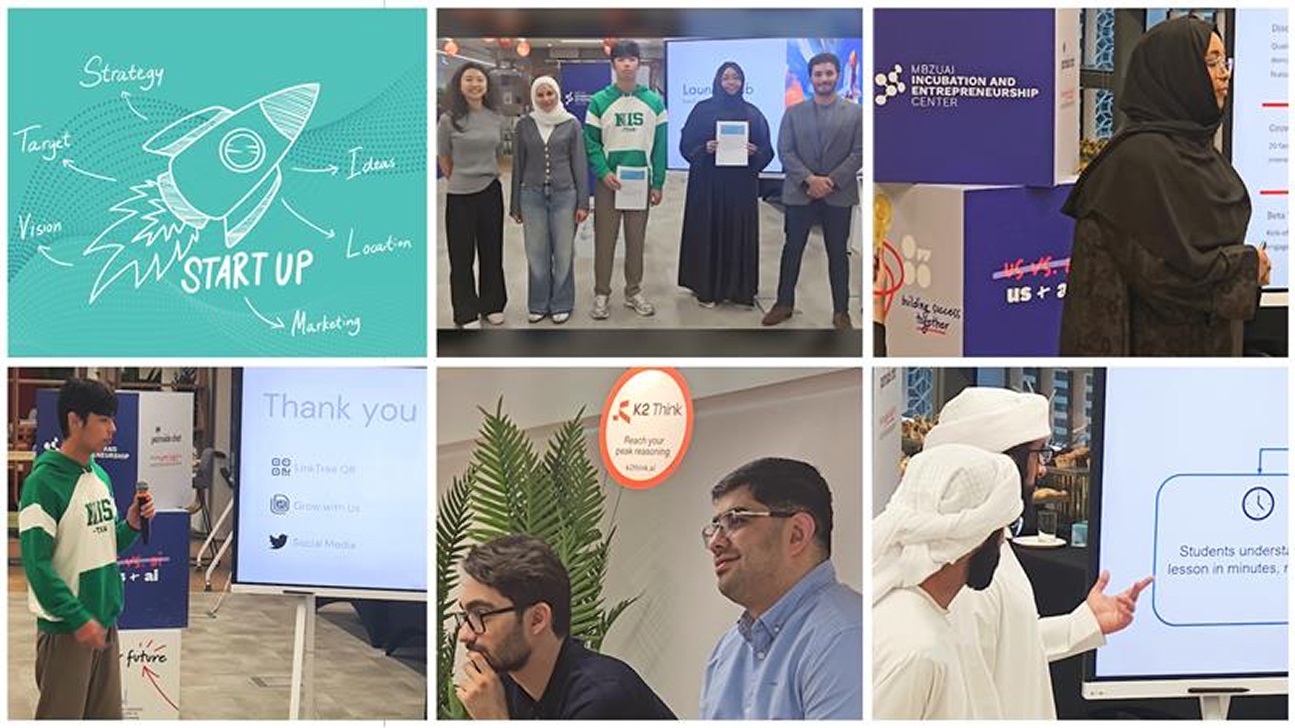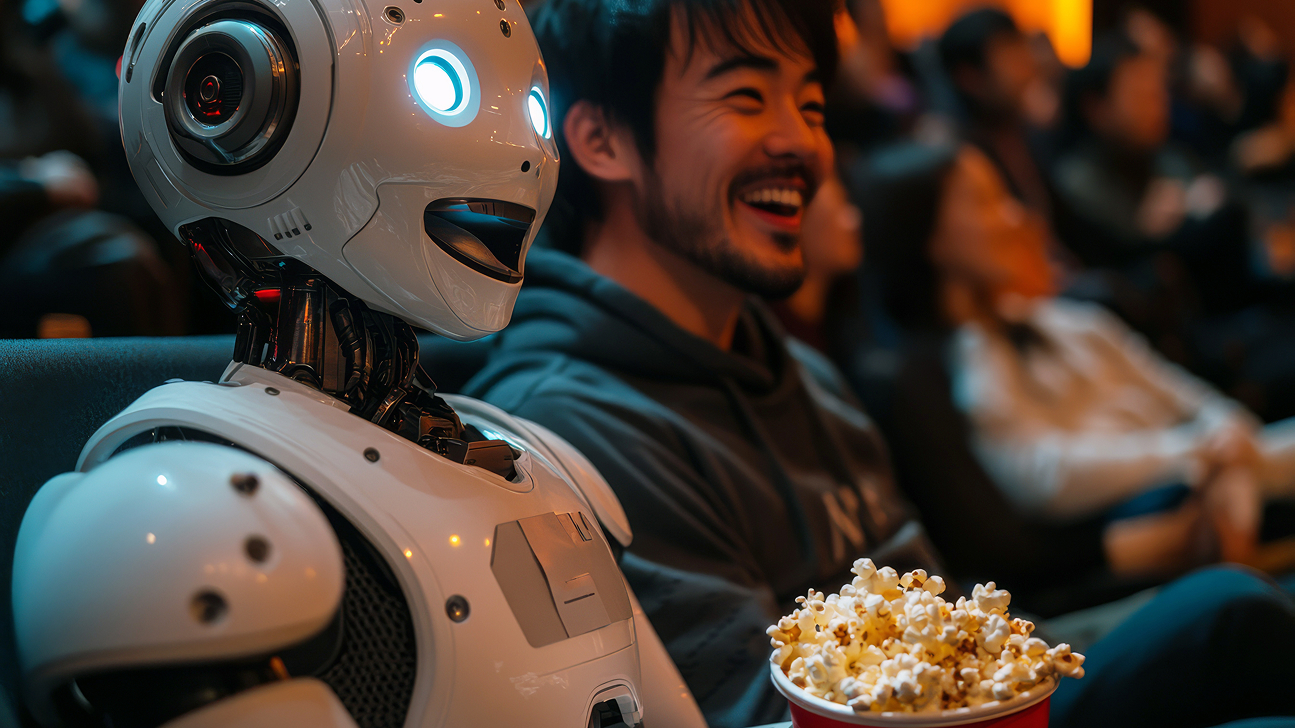Following in the footsteps of the Godfather
Thursday, August 07, 2025

When Rohit Bharadwaj arrived in Edinburgh to begin his Ph.D. in informatics, he wasn’t just joining one of the oldest universities in the world – he was also walking the path of a living legend: the ‘Godfather of AI’, Geoffrey Hinton.
“That was one of my big motivations,” he admits as we discuss his move from MBZUAI master’s graduate to Ph.D. candidate in the Scottish capital. “I thought, if I get an offer from here, why not take it? The Godfather of AI did his Ph.D. here, so those are pretty good footsteps to follow.”
For MBZUAI graduates like Bharadwaj, the University of Edinburgh is a highly sought after next step. Long recognized as a center for tech research and education, the university ranks among Europe’s top institutions for computer sciences. Its School of Informatics is home to pioneering research groups in machine learning, computer vision, natural language processing (NLP), robotics, and data science, and has played a leading role in shaping the modern AI landscape.
So when Bharadwaj neared the conclusion of his master’s in machine learning at MBZUAI in 2024, Edinbugh was high on his list of potential destinations.
“I looked into the rankings of the universities based on its research — especially in the fields or topics I’m interested in,” he recalls. “From there, I looked into the professors whose research interest aligns closely with whatever I have done in the past, and decided to cold mail them.
“My current supervisor here at Edinburgh replied to me and we had a discussion. He said he had an industry project – basically an industry Ph.D. – that is funded by an industry partner and came with a grant. He asked me to formally apply, and that’s how it all started.”

Balancing privacy and utility
Bharadwaj’s Ph.D. project is grounded in a pressing challenge: how to make AI systems that protect privacy while still delivering utlity. His research is centered on developing generative models – particularly diffusion models – that can anonymize datasets at the point of storage.
“Here in Europe there are very strict laws, such as GDPR,” he says, referencing the European Union’s General Data Protection Regulation. “Companies want to store data, but there are limits to what they can do. If there is no private information in the data, then they can store it for as long as they want, and the laws will not apply.”
This poses a difficult question: how much information can you erase before the data becomes useless?
“If you destroy too much information, there is nothing to learn from. You can’t make it useful. But if you keep too much, you’re leaking privacy.”
Trying to find this balance between ethics, legislation, and capability is what excites him most.
“The thing is, the incentives are aligned. Companies want good data to be able to offer better services, and that’s also what the people want. They just don’t always want their private data to be exposed or abused. It’s all about trying to find a solution that works for everybody.”
His research builds on the work he started at MBZUAI. “My master’s thesis was about open set generalization or zero-shot learning — learning with limited data or learning with no data at all.”
Bharadwaj studied under his primary supervisor Salman Khan, Associate Professor of Computer Vision, to develop his research for real-world uses.
“I really liked the way he was so clear with his concepts and his clarity on the topics. That really impressed me and that made me want to work with him – even though my master’s was in machine learning and he works in computer vision. My main motivation was to learn the theory and the math and then use it for real world applications. I’ve never wanted theory or dry math with no useful result – I always want to see the applications at the end, which is something Dr. Salman helped with.”
Together, they focused on novel object detection – a challenging problem in computer vision where models must identify objects they haven’t encountered during training. This type of generalization is essential for deploying AI systems in unpredictable environments where encountering new objects is the norm, not the exception. Potential applications could be for autonomous vehicles, industrial robots, medical imaging, and environmental monitoring.
Taking a chance
Before his research into zero-shot learning, Bharadwaj took a zero-shot chance of his own — cold emailing MBZUAI President and University Professor Eric Xing in a move that would foreshadow his approach to Edinburgh University.
“I saw an advertisement for MBZUAI and that was the first time I had heard about it. So I did my research and saw that Professor Eric Xing was there, who is one of the top professors in machine learning. I decided to just reach out to him and he got back to me. Everything he said about the university made me feel it was a perfect match for me.”
This bold approach has served Rohit well since childhood. As 10-year-old gamer, he built a YouTube channel that led to him becoming a YouTube partner. What began as play quickly evolved into curiosity about the technology behind it all — and by the time he was in his teens, Bharadwaj was already leaning toward computer science.
When it came time for university, he chose to pursue a dual degree in computer science and mathematics at BITS Pilani, one of India’s top-ranked engineering institutions. A love for research crystalized during his undergraduate years, confirming in his mind that academia was the path for him.
Now, having traveled halfway across the world to advance his education and make impact in the world, he is taking on his new environment with the same positive attitude that has defined his journey so far.
“Edinburgh is so different to MBZUAI and Abu Dhabi,” he says. “To start with, it’s very old in comparison. And I always have to check the weather app to see if I need to wear a jacket or not, which is not really the case in Abu Dhabi. But I’m really enjoying it here.
“There are other differences. While both universities have great brand value and reputation, Edinburgh is much more multidisciplinary. You meet people from diverse backgrounds and with a variety of interests and specialities, such as psychology and philosophy. Because of that there are more opportunities to learn and get different perspectives on things – as well as more scope to collaborate with people in different fields. It gives you a new mindset when you’re surrounded by people who aren’t only working in tech.”
What comes next?
Despite being immersed in high-level industry-driven research, Bharadwaj sees his future not in industry, but in academia.
“My ultimate goal is to become a professor,” he says. “I have always loved to teach. If I’m able to teach something to people, it also tests my own understanding. I’m open to industry positions as well, but I would rather not do anything that involves mainly engineering challenges, such as scaling up. I’m more interested in ideas or research problems – academia gives me that freedom to explore this side of things much more.”
And even though his immediate future is tied to the cooler-climes of Scotland, he admits he will always remember MBZUAI with great fondness: “MBZUAI gave me a foundation, a platform, and the confidence to aim higher,” he says. “I will always be grateful for that.”
- privacy ,
- alumni ,
- graduate students ,
- dataset ,
- Ph.D. ,
- Alumni Spotlight ,
Related
MBZUAI's Launch Lab equips alumni and students with practical startup tools
The six-week pilot program brought alumni and students together to turn early startup ideas into tangible ventures.
- alumni relations ,
- launch lab ,
- entrepreneurship ,
- alumni ,
- startups ,
AI and the silver screen: how cinema has imagined intelligent machines
Movies have given audiences countless visions of how artificial intelligence might affect our lives. Here are some.....
- science fiction ,
- fiction ,
- art ,
- artificial intelligence ,
- AI ,
- cinema ,
Mind meld: agentic communication through thoughts instead of words
A NeurIPS 2025 study by MBZUAI shows that tapping into agents’ internal structures dramatically improves multi-agent decision-making.
- agents ,
- neurips ,
- machine learning ,


